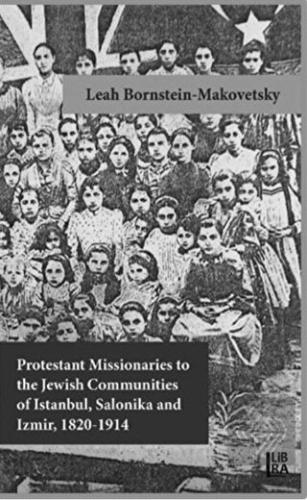
The book discusses the extensive evangelical, educational, medical and philanthropic activities of three Protestant missionary organizations inJewish society in Ottoman Empire during the nineteenth century up to the First World War. The study concentrates on the three large Jewishcommunities of Istanbul, Salonika and Izmir.
It covers many aspects of Jewish life, such as the legal and social status of Jews in OttomanEmpire, the traditional and modern education, intra-communal bitter disputes, the process of secularization, class affiliation, family life and statu of women. The focus of the research is on the missionaries' achievements and failure. Leah Bornstein Makovetsky emphasizes the Jewishcommunities response to the missionaries' various activities and examines the ways in which the Jewish leadership fought against any Christianinfluence on Jewish society in the course of decades in which far-reaching political, social and religious changes have taken place both in theOttoman Empire and in Ottoman Jewish society.
The book shows that protestant missionaries arrived in the Ottoman Empire with firm convictionsand grandiose plans, and foremost to lead to conversion of many Jews. At the same time the research considers the question of whether theProtestant mission had any real chance of success in its work among the Jews of Istanbul, Salonika and Izmir. The data and most of the informatio cited in the book are drawn largely from missionary reports and journals, and from Jewish sources, especially Responsa literature and JewishJournals
The book discusses the extensive evangelical, educational, medical and philanthropic activities of three Protestant missionary organizations inJewish society in Ottoman Empire during the nineteenth century up to the First World War. The study concentrates on the three large Jewishcommunities of Istanbul, Salonika and Izmir.
It covers many aspects of Jewish life, such as the legal and social status of Jews in OttomanEmpire, the traditional and modern education, intra-communal bitter disputes, the process of secularization, class affiliation, family life and statu of women. The focus of the research is on the missionaries' achievements and failure. Leah Bornstein Makovetsky emphasizes the Jewishcommunities response to the missionaries' various activities and examines the ways in which the Jewish leadership fought against any Christianinfluence on Jewish society in the course of decades in which far-reaching political, social and religious changes have taken place both in theOttoman Empire and in Ottoman Jewish society.
The book shows that protestant missionaries arrived in the Ottoman Empire with firm convictionsand grandiose plans, and foremost to lead to conversion of many Jews. At the same time the research considers the question of whether theProtestant mission had any real chance of success in its work among the Jews of Istanbul, Salonika and Izmir. The data and most of the informatio cited in the book are drawn largely from missionary reports and journals, and from Jewish sources, especially Responsa literature and JewishJournals
| Taksit Sayısı | Taksit tutarı | Genel Toplam |
|---|---|---|
| Tek Çekim | 792,00 | 792,00 |
| 2 | 403,92 | 807,84 |
| 3 | 274,56 | 823,68 |
| Taksit Sayısı | Taksit tutarı | Genel Toplam |
|---|---|---|
| Tek Çekim | 792,00 | 792,00 |
| 2 | 403,92 | 807,84 |
| 3 | 274,56 | 823,68 |
| Taksit Sayısı | Taksit tutarı | Genel Toplam |
|---|---|---|
| Tek Çekim | 792,00 | 792,00 |
| 2 | 403,92 | 807,84 |
| 3 | 274,56 | 823,68 |












